CMIG on Global Opportunities and Challenges
On October 12, 2016, before the third meeting of CMIG’s Global Advisory Council, members of the council including Stephen Orlins, Alistair Michie, Roland Berger, Angus Deaton and Romano Prodi were interviewed by multiple mainstream media outlets in Shanghai, discussing how Chinese companies should respond to challenges and seize opportunities in a global transformation context. Li Huaizhen, President of CMIG (China Minsheng Investment Group), also introduced CMIG’s development model and strategic plan.
CMIG president Li Huaizhen: the CMIG model is a great creation
At the news conference on the 12th, CMIG president Li Huaizhen noted that the CMIG model is a great creation under the leadership of the All-China Federation of Industry and Commerce, and it is playing a prominent guiding role.
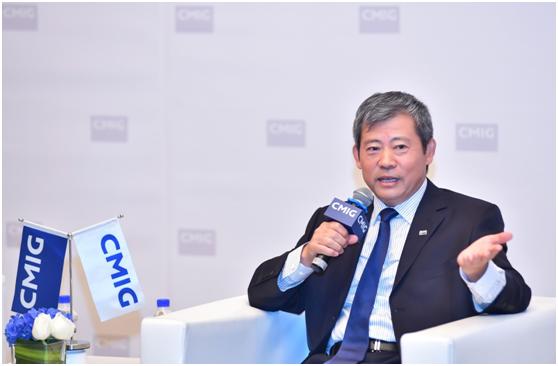
Li Huaizhen said, “The CMIG model is a great creation under the leadership of the All-China Federation of Industry and Commerce. In the past, China’s private enterprises all conducted business separately without converging their strengths. As China’s largest investment group purely consisting of private companies, CMIG is the first one like this in China.”
“In the two years since its founding, the leading role of CMIG has been evident. As reported in the media, private investment groups like Zhejiang United Investment Group, Jiangsu United Investment Group, Xiamen United Investment Group and Guangdong United Investment Group have been established one after another. China’s private economy has reached a new stage after decades of development. The new model of capital aggregation and group development (created by CMIG) has shown strong vitality.” Li Huaizhen further explained that although the growth of China’s private investment has slowed down in recent years, the assets of CMIG have grown by five times over the past two years from RMB33.5 billion to the current RMB200 billion. This proves the vitality of the new model.
He said, “Although private investment groups of other provinces in addition to ourselves are entities independent of each other without any equity relationship, there will definitely be business convergence. CMIG itself represents a “grouping” concept. It would be a great choice if we could seek joint development with private investment groups from different places. This should be one of our strategies.”
Stephen Orlins: CMIG represents a trend of overseas investment by private companies
Member of CMIG Global Advisory Council Stephen Orlins is the chairman of the National Committee on United States-China Relations. He was also an important witness and facilitator of the establishment of the Sino-US diplomatic relations 30 years ago.
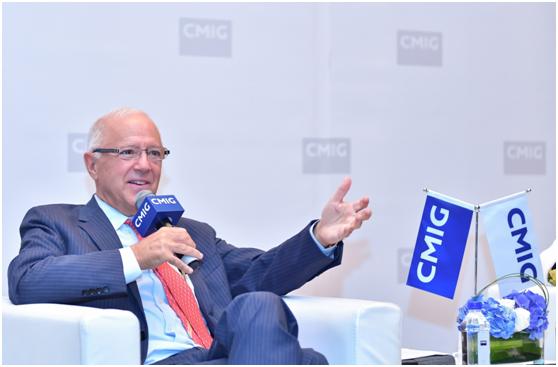
When interviewed on the 12th, Orlins remarked that 10 years ago, China’s investment in the US mostly came from state-owned companies, and rarely from private enterprises. But now, private companies have become the mainstream investors. CMIG has 60 shareholders and can well represent the trend of overseas investment by private companies. This is a fantastic example for private company investments entering the US.
He said that in general, the US welcomes foreign investment and actually prefers China’s private companies to state-owned companies. CMIG has established a global financial investment platform enabling China to go global. There is no doubt about it. CMIG is optimistic about investment in the US, with good future prospects, trends, and directions.
Alistair Michie: CMIG will become a financial group with global influence in the next 5 to 7 years
When interviewed in Shanghai, member of CMIG Global Advisory Council and Secretary General of the UK’s East Asian Council Alistair Michie shared secrets that could help Chinese companies go global and be integrated into the global system, pointing out that CMIG has played an exemplary role of pioneer in “going global.”
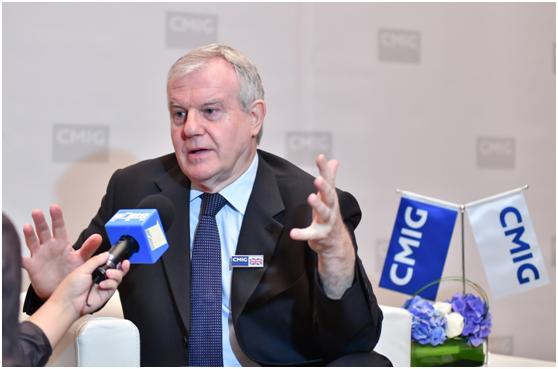
In the interview, Alistair Michie recalled how Chinese companies had impressed him during his stay in China in the past 20 years. He believes that CMIG has an innovative organization structure, outstanding not only in China but also globally, as it groups China’s most successful private enterprises as its shareholders and congregates them in advancing global ambitions, significantly reducing the risk and cost of investment.
Meanwhile,CMIG has established a Global Advisory Council. With insight into domestic development and the ability to utilize a powerful overseas business network, the council can identify the best opportunities globally, enabling CMIG to play an exemplary role of pioneer in “going global.” He believes that CMIG will become a financial group with global capabilities and influence in the next 5 to 7 years.
Roland Berger: CMIG will contribute to “One Belt One Road”
When interviewed on October 12th, member of CMIG Global Advisory Council and founder of Roland Berger Strategy Consultants Roland Berger noted that “One Belt One Road” is a very important opportunity for China’s non-state-owned enterprises, that is, private companies and institutions; it not only means support but also means benefit. Therefore, a very important non-state-owned financial institution like CMIG will absolutely support “One Belt One Road,” at the same time actively cooperating with the Chinese government and Asian Infrastructure Investment Bank. While benefiting from this, CMIG will enhance its cooperation with countries along the maritime and land Silk Road.
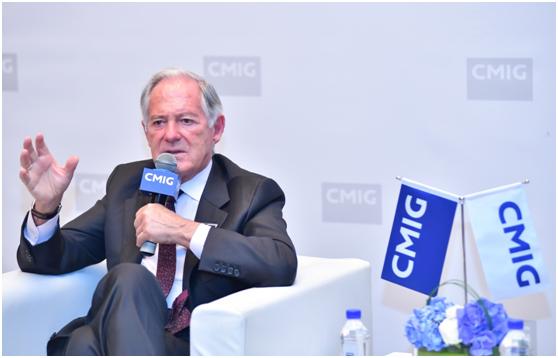
In Roland Berger’s opinion, CMIG is a very important and strong financial institution with a registered capital of RMB50 billion and assets of RMB200 billion. Its strength and size make it an extremely important player in the global financial industry, which will definitely make significant contribution to the “One Belt One Road” initiative.
Roland Berger also suggested that as the “One Belt One Road” covers many countries that have different cultural, political, and business systems, from China to across Europe, Africa and Asia, Chinese enterprises must be very strong financially and have sufficient business knowledge in the course of achieving their global ambitions.
Angus Deaton: There are still bright spots and opportunities amid the global economic slowdown
Sir Angus Deaton was the winner of the Nobel Prize for Economics in 2015 that has made important contributions to the analysis and research of consumption, poverty and welfare. He is a new member of the CMIG Global Advisory Council.
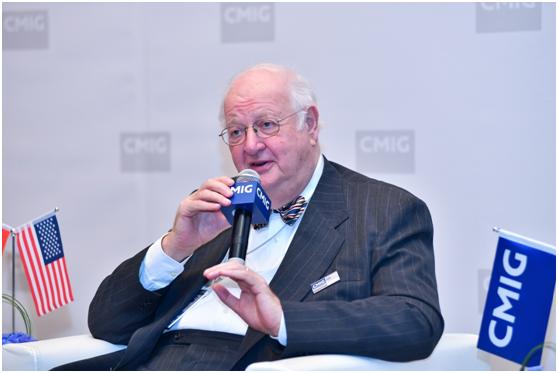
Deaton said, as a “super star” of economic growth for years, China has seen slow down in recent years. However, Deaton thought the growth rate of China’s economy is still enviable in the eyes of most of the countries in the world. He pointed out that there are still economic growth bright spots and investment opportunities in the world. Take India, for example. Its economic growth has not slowed down at all, and there exist many investment opportunities and growth opportunities. Similarly, Japan is also having nice economic growth compared to the past 20 to 30 years.
He specially pointed out that from a long-term perspective, the global economy can be deemed as a car driving on the road, and the road is bumpy. If we look back at the past 50 years, or 250 years, the progress of the world’s economic growth is huge, especially in China, and this growth will continue in the long run. “Therefore, in many places of the world, perhaps not every place, but most of the places, growth is starting or is being seen.”
Romano Prodi: China needs heavy lifters in the European and US markets
Member of CMIG Global Advisory Council Romano Prodi was former president of the European Commission and prime minister of Italy twice. In the interview, Prodi noted that today’s China is completely different from yesterday’s China. It now has many large multinational companies, which are willing to invest in development, research, innovation and various industries like machinery and chemicals. For example, CMIG has entered many industries that will be China’s focused industries in the future. To attain their goals, both China and its large companies must go global.
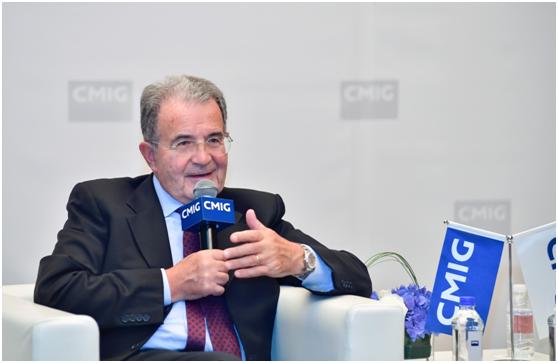
Prodi pointed out that the so-called globalization of China means there must be more Chinese heavy lifters in the European and the US markets. And, to become heavy lifters, these companies must have international strategy and vision. This is the reason why we are seeing a change: previously it was Europe and the US investing in China, and now it is the other way around, meaning China entering the European and US markets.
Although there are many markets to consider, Prodi believes the priority consideration should be the European market, as investors have many choices there. For low cost countries, Europe has Romania and Bulgaria, and for equipment and tools relating to scale machinery, Germany and Italy. For food, Italy comes to mind. The market provides a variety of choices.
- CMIG Drawin: Promote Rapid Growth of Whole Industry Chain Business with Technological Advantages
- CMIG Futurelife’s Subsidiary Serves Beijing Daxing International Airport
- “Loving CMIG, Investing on the Future” Launching Ceremony held by CMIG
- CMIG is Awarded “Excellent Developer of Finance Shared Services of Chinese CFO 2018”
- The First Agreement on Comprehensive Cooperation Officially Signed between CMI and the Great Wall Assets
- Hana Financial Group Visited CMIG Subsidiary and Expressed Future Support
- CMIG joins hands with GWA MCC to build model for cooperation between state-owned financial institution and large-sized private enterprises
- Strong Combination Boosts Shandong's Driving Force Conversion
- Yang Xiaoping Assumes Post of Co-chairman of CMIG Board
- CMIG Hosts New Year Concert
- Liu Qiuming, President of CMIG Capital: Focus onSelf-Independent Enterprises in Weak-Cyclical Industry
- Steady Growth in Slumping Market, CMIG Jiaye Accelerates Strategy Adjustment by Two-Wheel Drive
- Graduate of Migrant School Received Offer from Harvard
- Integrating High-quality Properties, and Making Profits in Community Commerce. How will the “pillar” sector CMIG Futurelife operate in the future?
- Sirius Insurance, CMIG's subsidiary, goes public on Nasdaq
- China Minsheng bets on rural economy with 10 billion yuan investment fund
- CMIG’s New President Explains Development Strategies for the Future
- China Minsheng on Rural Economy Mission
- Agriculture Sector to Boom in China as Shelter for Global Investors
- CMIG International Out to Build World-class Financial Services Platform